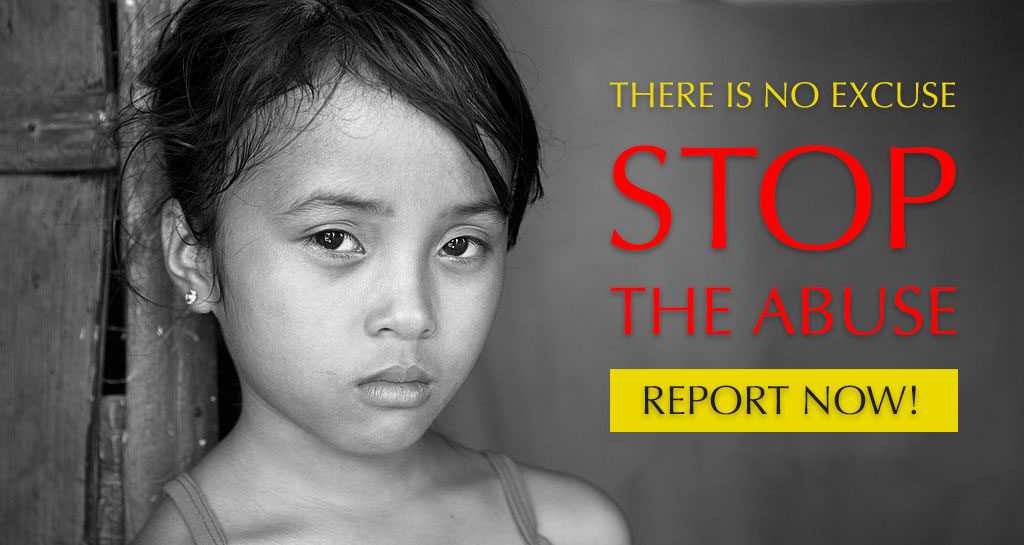This blog is a call to action.
There are various forms of child abuse. For this blog, I will limit it to the following:
- Neglect
- Physical abuse
- Emotional abuse
Neglect
Most abused children are often neglected by their parents and guardians. So, what constitutes neglect? According to National Society for the Prevention of Cruelty to Children, there are four types of neglect:
- Physical neglect: Failing to provide for a child’s basic needs such as food, clothing or shelter. Failing to adequately supervise a child,or provide for their safety.
- Educational neglect: Failing to ensure a child receives an education.
- Emotional neglect: Failing to meet a child’s needs for nurture and stimulation, perhaps by ignoring, humiliating, intimidating or isolating them. It’s often the most difficult to prove.
- Medical neglect: Failing to provide appropriate health care, including dental care and refusal of care or ignoring medical recommendations.
If there are signs that a child you know is suffering from or suffered from one or more types of neglect, you should report it immediately. Remember, some of the signs might not fit neatly into one of the categories. So, for example, failing to knowingly protect the child from a bully for an extended period, failing to notice or take action on a child suffering from jaundice, which shows very obvious physical symptoms, or intimidating a child saying that s/he will not provide basic necessities if they don’t behave would constitute neglect.
Physical Abuse
Physical abuse is often considered easy to spot. But it’s not always the case. Some abusers are cognizant of their abusive behavior and adjust their practices with an objective of hiding the symptoms. There are extreme cases of violence against children. Then there are many more cases of everyday physical abuse such as stabbing a child with a pen or pencil or hitting them. Physical abuses are easily categorized as a crime in most countries. Report immediately.
Emotional abuse
In the UK, emotional abuse is defined as “the persistent emotional maltreatment of a child such as to cause severe and persistent adverse effects on the child’s emotional development.” Emotional abuse is the hardest to prove but it has a significant long-term impact on an individual. Here are some of the signs of emotional abuse:
- humiliating or constantly criticising a child
- threatening, shouting at a child or calling them names
- making the child the subject of jokes, or using sarcasm to hurt a child
- blaming, scapegoating
- persistently ignoring them
- manipulating a child
- forcing a child to be friends with a bully
- not saying anything kind, expressing positive feelings or congratulating a child on successes
- not showing any emotions in interactions with a child, also known as emotional neglect
Long-term Impact
There are long-term consequences of child abuse and neglect. They include physical health, psychological, behavioral and societal consequences. The effects vary based of various factors such as child’s age and developmental status when abuse or neglect occurred; the type of maltreatment; frequency, duration, and severity of maltreatment; the relationship between the child and the perpetrator. When the abuser or perpetrator is a family member, the abuse can be life-long suffering. Read more about it at the US government’s child welfare site referenced below.
Reporting Abuse
In most of the states in the United States, there are mandatory reporting requirements if one suspects any kind of abuse. However, there are some statutes of limitations for certain categories of abuse. In the United Kingdom, it’s never too late to report abuse. After all, “a child cannot consent to abuse.” In addition to criminal reporting, there are also civil recourses. There are various national and local organizations that can help victims and people who wish to report abuse. Remember, abusers tend to continue their abusive behavior. Stop them from abusing more children.

Reference
- National Society for the Prevention of Cruelty to Children (https://www.nspcc.org.uk/preventing-abuse/child-abuse-and-neglect/neglect/)
- Official definitions of emotional abuse (https://www.nspcc.org.uk/preventing-abuse/child-abuse-and-neglect/emotional-abuse/what-is-emotional-abuse/)
- Long-Term Consequences of Child Abuse and Neglect (https://www.childwelfare.gov/pubs/factsheets/long-term-consequences/)
- Non-recent abuse (https://www.nspcc.org.uk/preventing-abuse/signs-symptoms-effects/non-recent-abuse/)
